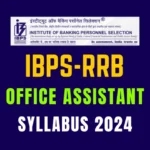IBPS Clerk Syllabus
This is an overview of the syllabus, so please refer to the official link of the notification and syllabus for this job post released by IBPS Clerk on its official website.
The IBPS Clerk Exam syllabus is divided into two main sections: Preliminary Examination and Main Examination. Below is a detailed syllabus for both sections:
1. Preliminary Examination
The Preliminary Exam is the first stage of the IBPS Clerk recruitment process. It consists of three sections:
a) English Language
- Reading Comprehension: Passages with questions based on the content.
- Cloze Test: A passage with missing words that must be filled in.
- Spotting Errors: Identifying grammatical errors in sentences.
- Sentence Improvement: Rewriting sentences with errors to make them grammatically correct.
- Fill in the Blanks: Completing sentences with appropriate words.
- Para Jumbles: Rearranging jumbled sentences to form a coherent passage.
- Synonyms & Antonyms: Vocabulary-based questions on words and their meanings.
b) Numerical Ability
- Simplification: Basic arithmetic calculations and simplification.
- Number Series: Finding the missing number in a series.
- Data Interpretation: Interpreting data from tables, graphs, and charts.
- Quadratic Equations: Solving quadratic equations.
- Data Sufficiency: Determining if the provided data is sufficient to answer a question.
- Percentage, Ratio & Proportion: Basic arithmetic problems involving percentages, ratios, and proportions.
- Profit and Loss: Problems based on profit, loss, and discounts.
- Simple & Compound Interest: Calculating interest in various scenarios.
- Work & Time: Problems on work efficiency and time management.
- Time & Distance: Problems on speed, time, and distance.
- Mixture & Allegations: Problems involving mixtures and solutions.
c) Reasoning Ability
- Puzzles: Complex problem-solving scenarios involving arrangements, rankings, etc.
- Syllogism: Logical reasoning questions based on statements and conclusions.
- Inequalities: Problems involving mathematical inequalities.
- Coding-Decoding: Deciphering codes from given patterns.
- Blood Relations: Questions based on family relationships.
- Order & Ranking: Arranging people or objects based on given criteria.
- Alphanumeric Series: Series of alphabets and numbers to find patterns.
- Direction Sense: Problems requiring knowledge of directions.
- Seating Arrangements: Linear and circular seating arrangements.
2. Main Examination
The Main Exam is the second stage of the IBPS Clerk recruitment process. It consists of four sections:
a) General/Financial Awareness
- Current Affairs: Important national and international news.
- Banking Awareness: Knowledge of the Indian banking system, banking terms, and concepts.
- Financial Awareness: Financial news, policies, and updates.
- Static GK: Important dates, events, books, and authors.
- Indian Economy: Basics of the Indian economy, economic policies, and budget.
- Government Schemes: Knowledge of various government schemes and initiatives.
b) General English
- Reading Comprehension: Passages with questions based on content.
- Cloze Test: Passage with missing words that must be filled in.
- Error Spotting: Identifying grammatical errors in sentences.
- Sentence Improvement: Correcting sentences with errors.
- Fill in the Blanks: Completing sentences with appropriate words.
- Synonyms & Antonyms: Vocabulary-based questions on words and their meanings.
- Para Jumbles: Rearranging jumbled sentences to form a coherent passage.
- Word Association: Pairing words with their related terms.
- Phrase Replacement: Replacing phrases with appropriate alternatives.
c) Reasoning Ability & Computer Aptitude
- Puzzles: Complex problem-solving scenarios involving arrangements, rankings, etc.
- Syllogism: Logical reasoning questions based on statements and conclusions.
- Inequalities: Problems involving mathematical inequalities.
- Coding-Decoding: Deciphering codes from given patterns.
- Blood Relations: Questions based on family relationships.
- Order & Ranking: Arranging people or objects based on given criteria.
- Seating Arrangements: Linear and circular seating arrangements.
- Direction Sense: Problems requiring knowledge of directions.
- Computer Aptitude: Basic knowledge of computers, including:
-
- Operating Systems: Basic knowledge of operating systems and their functions.
- Software & Hardware: Understanding of software applications and hardware components.
- Internet: Basics of internet usage and related terms.
- MS Office: Knowledge of MS Word, MS Excel, MS PowerPoint, etc.
- Computer Networking: Basics of networking concepts and protocols.
- Database Management: Basic understanding of database concepts.
d) Quantitative Aptitude
- Simplification: Basic arithmetic calculations and simplification.
- Number Series: Finding the missing number in a series.
- Data Interpretation: Interpreting data from tables, graphs, and charts.
- Quadratic Equations: Solving quadratic equations.
- Data Sufficiency: Determining if the provided data is sufficient to answer a question.
- Percentage, Ratio & Proportion: Basic arithmetic problems involving percentages, ratios, and proportions.
- Profit and Loss: Problems based on profit, loss, and discounts.
- Simple & Compound Interest: Calculating interest in various scenarios.
- Work & Time: Problems on work efficiency and time management.
- Time & Distance: Problems on speed, time, and distance.
- Mixture & Allegations: Problems involving mixtures and solutions.
- Mensuration: Problems on area, volume, and surface area.
- Probability: Basic probability problems.
- Permutations & Combinations: Counting and arrangement problems.
3. Interview (If applicable)
- While the IBPS Clerk exam generally does not include an interview stage, candidates must be prepared for document verification and other formalities as per the organization’s guidelines.
Important Points:
- Negative Marking: There is a penalty of 0.25 marks for each wrong answer in both Preliminary and Main examinations.
- Sectional Cut-offs: Candidates must clear the sectional cut-offs along with the overall cut-offs in both exams to qualify.
Please refer to the official syllabus using the link provided below:
| Official website | IBPS |
| Official Notification and Syllabus | Download Link |


